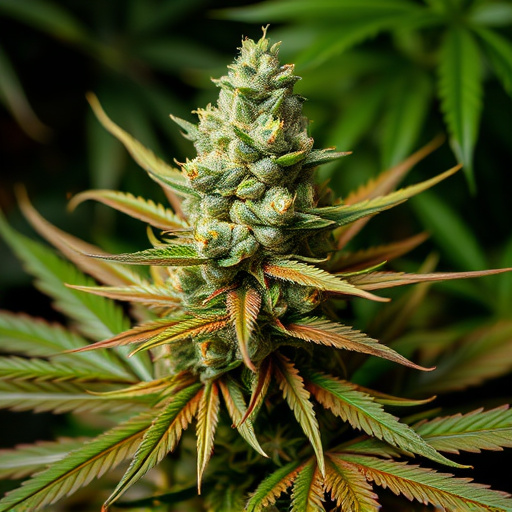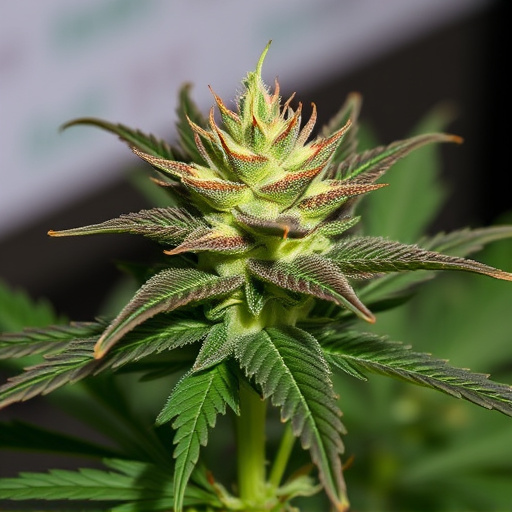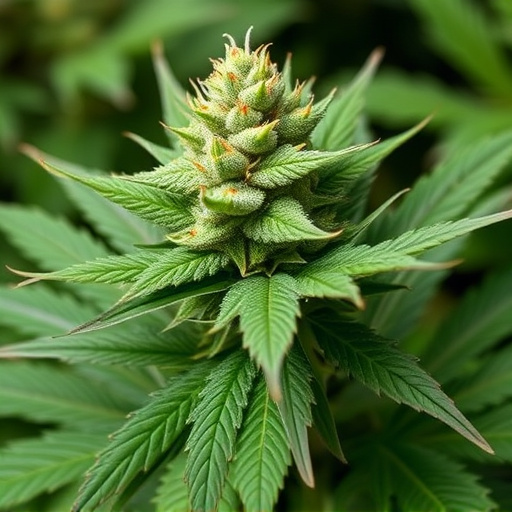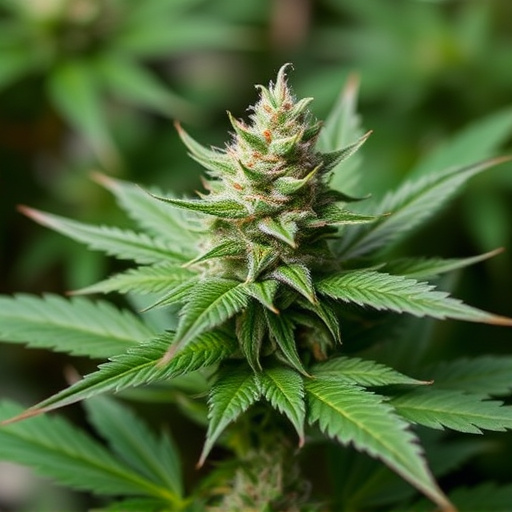The complex chemical composition of cannabis flower, featuring over 100 cannabinoids, interacts with the body's endocannabinoid system for various physiological regulations. While THC is known for its psychological effects, cannabidiol (CBD) offers significant therapeutic benefits without intoxication, such as anti-inflammatory and seizure reduction. The best medical cannabis strains vary based on individual needs, emphasizing personalized treatment approaches. Different strains have unique cannabinoid profiles tailored to specific conditions like pain, anxiety, sleep, and stress. Contemporary medicine recognizes cannabis flower's value for alleviating symptoms of chronic pain, multiple sclerosis, epilepsy, anxiety disorders, and certain cancers, with advanced cultivation techniques enabling precise cannabinoid profiles. As clinical trials advance and legal landscapes evolve, cannabis-based treatments look promising for integration into conventional medicine globally.
“Unveiling the transformative power of cannabis flower in modern medicine, this article delves into its therapeutic properties and explores how it’s revolutionizing healthcare. From understanding the science behind its effects to uncovering the best medical cannabis strains for diverse conditions, we navigate this intricate plant’s potential.
We’ll discuss specific strains tailored to various ailments, shedding light on their unique compositions and benefits. Additionally, we’ll examine cannabis’s evolving role in medicine and its promising future prospects.”
- Understanding the Therapeutic Properties of Cannabis Flower
- Exploring the Best Medical Cannabis Strains for Different Conditions
- The Role of Cannabis in Modern Medicine and Future Prospects
Understanding the Therapeutic Properties of Cannabis Flower

Cannabis flower, known for its diverse chemical composition, offers a range of therapeutic properties that have garnered significant interest in the medical community. Its most renowned component, tetrahydrocannabinol (THC), is responsible for many of the plant’s psychological effects, but it’s just one piece of the puzzle. Cannabis contains over 100 cannabinoids, each with unique interactions within the body’s endocannabinoid system. This intricate system plays a crucial role in regulating various physiological processes, including pain perception, mood, and appetite.
Understanding these interactions is key to unlocking the potential of medical cannabis. Certain strains, known for their high concentrations of specific cannabinoids like cannabidiol (CBD) or tetrahydrocannabinol (THC), have proven effective in treating a variety of conditions. For instance, CBD-rich strains are celebrated for their anti-inflammatory and seizure-reducing properties, while THC-dominant varieties can aid in alleviating chronic pain and stimulating appetite. The best medical cannabis strains often depend on individual patient needs, highlighting the importance of personalized treatment approaches when exploring these therapeutic options.
Exploring the Best Medical Cannabis Strains for Different Conditions
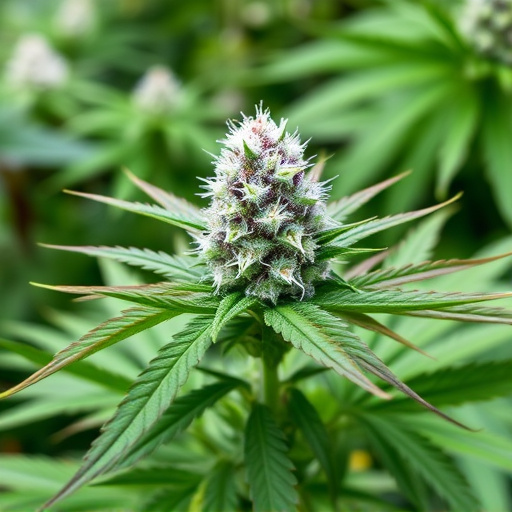
When exploring the world of medical cannabis, understanding the diverse range of strains and their unique properties is crucial. Different strains offer varying levels of cannabinoids like THC and CBD, making some more suitable for specific medical conditions than others. For instance, high-CBD strains are often preferred for managing pain, anxiety, and epilepsy due to their minimal intoxicating effects. On the other hand, indica strains, rich in THC, can be beneficial for sleep disorders and chronic pain because of their relaxing properties. Sativa strains, known for boosting energy and mood, may assist patients with depression and ADHD.
Identifying the best medical cannabis strains involves considering an individual’s specific needs and preferences. Some strains have been cultivated specifically to maximize certain cannabinoids, catering to tailored medical requirements. For instance, ‘Blue Dream’ is renowned for its high CBD content, making it ideal for pain relief without the mental impairment often associated with traditional painkillers. ‘Pineapple Express’, rich in THC, offers a potent solution for nausea and appetite loss, while ‘Granddaddy Purple’ is an indica known for its sedative effects, beneficial for insomnia and stress reduction.
The Role of Cannabis in Modern Medicine and Future Prospects
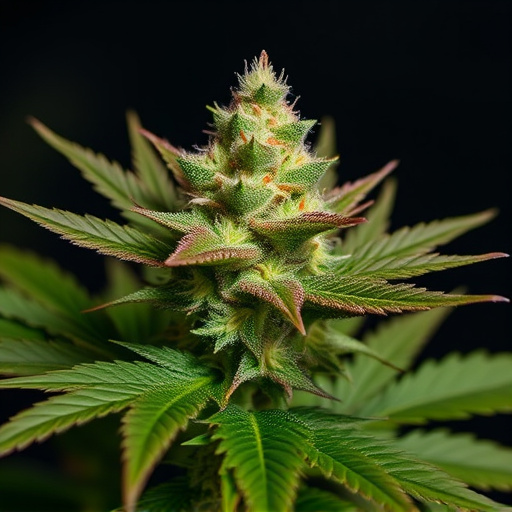
In contemporary medicine, cannabis flower has emerged as a valuable asset, offering therapeutic benefits for a wide range of medical conditions. The unique chemical composition of this plant, particularly its rich cannabinoid profiles, allows it to interact with the human endocannabinoid system, modulating pain perception, inflammation, and mood, among other functions. Research into the best medical cannabis strains has uncovered their potential in alleviating symptoms associated with chronic pain, multiple sclerosis, epilepsy, anxiety disorders, and certain forms of cancer. As scientific understanding deepens, the scope for integrating cannabis-based treatments into conventional medicine expands, promising a future where this natural compound plays a pivotal role in enhancing patient care and quality of life.
The outlook for cannabis in modern medicine is promising, with ongoing studies exploring its potential across various therapeutic areas. The development of sophisticated cultivation techniques and genetic engineering has enabled the production of best medical cannabis strains with precise cannabinoid profiles tailored to specific medical needs. This precision medicine approach holds great potential for personalized treatment plans, optimising patient outcomes while minimising adverse effects. As the legal landscape continues to evolve, facilitating access to high-quality medical cannabis, clinical trials will play a crucial role in establishing its efficacy and safety, paving the way for wider acceptance and integration into healthcare systems worldwide.
Cannabis flower, with its diverse therapeutic properties, has emerged as a valuable asset in modern medicine. By understanding the unique benefits of different cannabis strains, healthcare professionals can tailor treatments to specific conditions, providing patients with effective and natural solutions. The growing body of research highlights the potential of best medical cannabis strains in managing pain, reducing inflammation, and addressing various health challenges. As we look ahead, continued exploration and integration of cannabis into mainstream medicine hold promise for improving patient care and quality of life.




